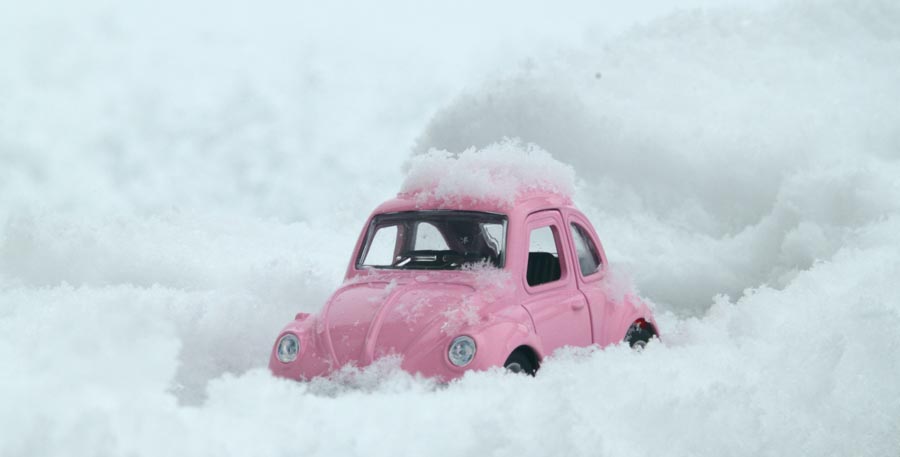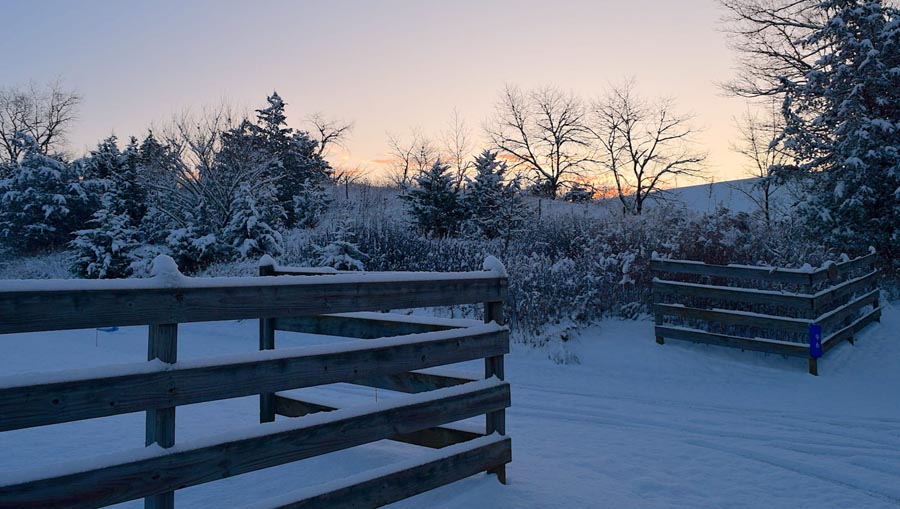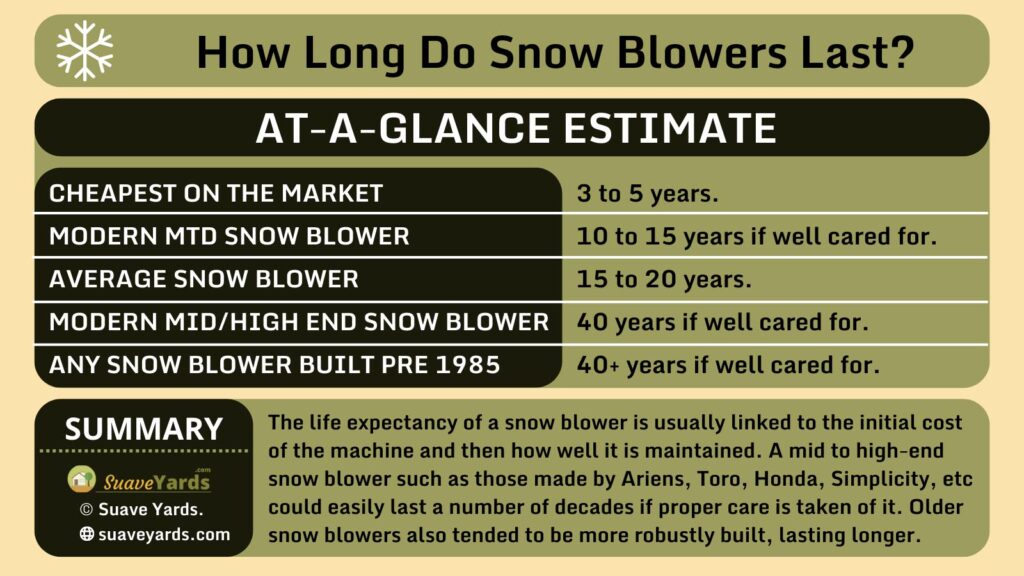
How long do snow blowers last, isn’t a simple question to answer.
It does vary depending upon a number of factors.
But with some careful research, proper maintenance and a few other things, there is no reason your snow blower cannot last you a LONG time.
In this post we take a look at snow blower life expectancy, and how to make clearing snow as effortless as possible both physically and financially!
So let’s get started.
How Long Do Snow Blowers Last?
The life expectancy of a snow blower will depend heavily upon how much you want to spend in the first place and then how well you look after it. A well-cared-for, mid-to-high-end snow blower could easily last for 40 years plus. The cheapest snow blower on the market, could easily only last two or three years.
Snow Blower Life Expectancy: What Influences It?
FACTOR #1: The Initial Cost
One of the generally accepted truths of life is that quality isn’t cheap.
If you pay $1,000 for a snow blower, the strong likelihood is that it will last longer than a $300 snow blower
Longevity and manufacturing quality do go hand in hand.
Although it might cost you two or three times as much initially, if your snow blower lasts you four or five times as long that investment will have been worth it.
FACTOR #2: How Well Is It Maintained and Cared For?
One of the biggest influences on the life expectancy of a snow blower is the commitment of the owner to it.
If you are willing and able to rebuild or replace anything that breaks, ie engines, gearboxes, etc, then you can keep your snow blower running for a long time.
Then of course there is the more standard maintenance such as replacing air filters, spark plugs, changing the oil and fuel, all the little things that over the seasons will keep your snow blower running nicely.
Storage is equally important. If you leave it out in the elements a snow blower will degrade far quicker than if you keep it dry in a shed/garage.
On top of this, if it is left somewhere cold enough, any snow left in the blades might freeze and then jam up the machine the next time you try and use it.
When you stop using your snow blower in the warmer months, do you drain or stabilize the fuel? Again that will prolong the life of the machine as well.
Look after your snow blower and it will look after you.
RELATED ===> Buyers Guide: The Best Snow Blowers on the Market
FACTOR #3: How Is It Used?
Really this is just an extension of the point made above, but how you use your snow blower will have a bearing on its life span.
We all have those friends (maybe it is you!), that are hard on everything they use. Shifting the gears as if their lives depend on it, breaking heavily, stamping the clutch, etc, etc.
Do you engage and disengage the augers frequently? Do you engage the augers with a full bucket of snow? Do you drive your machine at a speed into heavy snow banks?
Operator usage is a big cause of breakdowns and early replacements.
FACTOR #4: Are Parts Easily Available?
You can take the utmost care of your snow blower and be a mechanical wizard who can fix anything, but a snow blower will only last as long as the manufacturer continues to supply vital parts.
And this can be the problem with older snow blowers, finding the right parts can be tricky.
Once you can’t get a replacement for a vital part of your snow blower it could be game over unfortunately.
FACTOR #5: How Much Snow Will It Need to Clear?

The more snow there is to clear, the more stress there is put on your snow blower.
If you live in an area that gets a lot of snow over a prolonged period, you will need a more robust snow blower than somewhere that gets moderate levels of the white stuff.
A light-duty machine won’t last long in an area with heavy-duty snow!
FACTOR #6: Do You Want Salt With That?
Salt and the other chemicals put down on the road during wintry weather are the enemy of the underbodies of snow blowers, cars and any machine made of metal in fact.
If you don’t clean them effectively, the salt can cause the machine to rust and corrode.
If you live in an area that uses a lot of salt, make sure you clean your snow blower regularly.
There are even special salt-dissolving sprays you can buy to get rid of any sediment.
RELATED ===> Are Toro Snow Blowers Better Than Ariens?
FACTOR #7: How Old is the Snow Blower?
It might be a perception that gets filtered over time, but generally snow blowers built in the early 1980s and before tend to be much more durable than modern snow blowers.
These older machines were made of stronger materials, with less plastic, and usually have cast iron engines and a heavier gauge of steel than many snow blowers built today.
Maybe this is a typical case of ‘things were better when I was a kid’, but new units seem to have much more in the way of plastic and thinner metals.
So a well-cared-for, second-hand snow blower from 1982, might last longer than a brand-new snow blower from 2022!
So How Long Will A Snow Blower Last? And Which Brands Last the Longest?

I know, I know, you just want to know how long a snow blower will last!
As I have outlined there are many variables, but I will try and give a rough overview from my own experience and that of others I found as I was doing my research:
- Cheapest Snow Blowers on the Market (ie $150 to $300): 3 to 5 years maybe…
- A Modern MTD Snow Blower (ie Cub Cadet, Craftsman, Troy-Bilt): 10 to 15 years if well looked after.
- Average Snow Blower with Average Care: 15 to 20 years.
- A Modern Mid-to-High End Snow Blower (ie Ariens, Snapper, Toro, Honda, Simplicity, John Deere, costing around $750 or more from new): 40 years with good care.
- Any Snow Blower Built Before 1985: 40 years plus with good care.
As I say there are a huge number of factors that influence this, but I know everyone likes seeing numbers!
Note these are just my assumptions…
So which brands last the longest?
Well when I was writing this article I did a lot of research via the Snow Blower Forum. This is what one of the users posted in response to a particular question (click to see a larger version of the image):

And I think that sums things up pretty well.
The older Ariens in particular show a lot of longevity. In fact I quote another user on the forum who said: “If you happen to see an Ariens from the 1970s for sale in any condition, buy it. These are solid machines.”
RELATED ===> Can Snow Blowers Be Left Outside?
Many other user experiences reflected this.
It does all depend on what you are looking for and how much you are willing to pay.
For instance, MTD is generally considered to be a lower-quality manufacturer, but they are a lot cheaper.
It is also worth knowing that whilst people often deride Cub Cadet as a dressed-up MTD machine, that hasn’t always been the way.
MTD bought out Cub Cadet in 1983, and for many years the quality of them remained consistently high. It was around 2000 that they were rebranded MTD Troy-Bilt and quality dipped.
As mentioned in the quote above, both Toro and Honda are highly regarded as well.
In short, a mid-to-high-end snow blower that is well cared for should last you (almost) a lifetime, as shown in the infographic below.
Final Thoughts

There is no doubt that there are plenty of snow blowers built in the 80s, 70s and even the 1960s still going strong.
The thing most of these machines will have in common is that they have been meticulously cared for and were also probably quite expensive at the time they were purchased.
And that runs true for today’s snow blowers.
Whilst the build quality might not be universally as high as it was 20/30/40 years ago, if you are prepared to spend a bit extra on a top-end snow blower now, and put in a bit of extra time taking care of it will be something you can pass on to the next generation of your family!
There is of course a fine balancing act here in terms of how much you will use your snow blower.
But if you live in an area that gets lots of heavy snow over three or four months each year, spending more on a high-end snow blower is definitely going to be worth it in the long-run.
I hope this helps!
